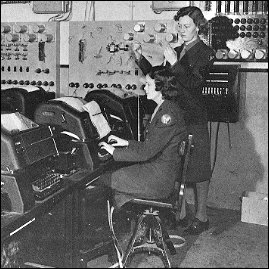[We've since appended a correction to this story.]
BROOKE GLADSTONE: And I’m Brooke Gladstone. This week, Edward Snowden, former NSA employee, recent leaker of huge domestic surveillance programs and current fugitive, was given temporary asylum in Russia. There's a certain inevitability in that. Back in the pre-digital 1940s, telegrams were the basis of the first large-scale domestic surveillance program, launched by an agency that would become the NSA. Joe Kloc, a writer for Daily Dot, has been exploring that history, Joe, welcome to On the Media.
JOE KLOC: Great to be here.
BROOKE GLADSTONE: August, 1945, it's the end of WWII. We all know that the Allies’ success in that outcome had a great deal to do with foreign intelligence. How did telegrams come into play at that point?
JOE KLOC: Well, at that point, it was still a major means of international communication. Particularly of interest at the time was the US and Russia. There was that awareness that there’s this pipeline going on between covert spies in the US and Russian intelligence. Twelve days before the Trinity test that was proof positive of the atomic bomb, the plans for this bomb had been leaked to Russia. And so, these telegrams were a way to dig into the pipeline right at the source.
BROOKE GLADSTONE: So the Army came in and said, we want a direct line into the traffic of international telegrams, to the three major telegraph companies, right, which were IT&T World International, RCA Global and Western Union. But specifically, what did they ask for?
JOE KLOC: The copies of all of the internationally exchanged telegrams. What they would do is a courier would go to major offices in San Antonio, San Francisco, New York and Washington, DC and pick up punch card style things, if you can imagine. Later on it was magnetic tape. But they would take all of this back to the agency offices and they would particularly look for encrypted messages or messages that had some sort of double meaning.
BROOKE GLADSTONE: So this was always intended to track foreign communications but, obviously, Americans would get swept up in that net. That's one of the places where you draw a direct parallel between this program, which was called Shamrock, and the program that was exposed by Edward Snowden, which was called PRISM.
JOE KLOC: Right. In both cases, what you ultimately have is an organization, that is the NSA, that is collecting a massive amount of information about private citizens.
BROOKE GLADSTONE: There was a another parallel you drew, which was the company's reaction to being plundered, I suppose, in this way.
JOE KLOC: When the companies were originally approached in the case of Shamrock, they didn't want to participate, and they asked for certain legal assurances from the Executive Branch, and didn't initially get them but over time did get the sort of underhanded assurances that things would not go poorly for them if they participated. But it was always sold to them and put on them as this idea of a patriotic duty.
BROOKE GLADSTONE: Did they ever get the assurances that they sought?
JOE KLOC: In a funny way, yes, they did, in 2008.
BROOKE GLADSTONE: In 2008?
JOE KLOC: In 2008 [LAUGHS], when an amendment was passed to the Foreign Intelligence Surveillance Act. It guaranteed protection for telecommunication companies that aid the government in matters of national security. It was retroactive protection.
BROOKE GLADSTONE: If anybody wanted to sue Western Union now, Western Union would be protected.
JOE KLOC: Exactly.
BROOKE GLADSTONE: Under the Foreign Intelligence Surveillance Act, the same act that gave rise to the FISA courts. There weren’t any FISA courts back in the early days of the NSA, right, when it was overseeing Shamrock? What kind of oversight was there?
JOE KLOC: There was very, very little oversight. The agency only had one lawyer and, as legend has it, he arranged to have his position abolished so he could retire.
BROOKE GLADSTONE: [LAUGHS] So, Shamrock continued from the fifties, and in the mid-seventies come a series of revelations about surveillance, both domestic and foreign, among them, an exposé of Shamrock. So what happens then?
JOE KLOC: Well, in response to that, the Church Committee was formed, which was specifically designated to investigate all of these different projects.
BROOKE GLADSTONE: Headed by Senator Frank Church.
JOE KLOC: Right. That evolved into the Senate Intelligence Committee, which is now responsible for investigating PRISM. You ultimately have a very similar project that sort of technologically updated being investigated by the committee that is the successor to the one that investigated Shamrock, and debating many of the same laws that were established surrounding Shamrock.
BROOKE GLADSTONE: It just fills one with pride to see how far we've come, doesn’t it, Joe?
JOE KLOC: Yeah, yeah. [LAUGHS]
BROOKE GLADSTONE: [LAUGHS] So do you have any thoughts as the telegram fades away?
JOE KLOC: It was killed by it’s own successors, and I think that's the most admirable way a technology can go.
[BROOKE LAUGHS]
We owe it a lot. Reducing all of this information into the simplest little bit and then recreating it on the other side, that’s just what we do all the time now.
BROOKE GLADSTONE: Joe, thank you very much.
JOE KLOC: Thank you.
BROOKE GLADSTONE: Joe Kloc is a writer for the Daily Dot.

